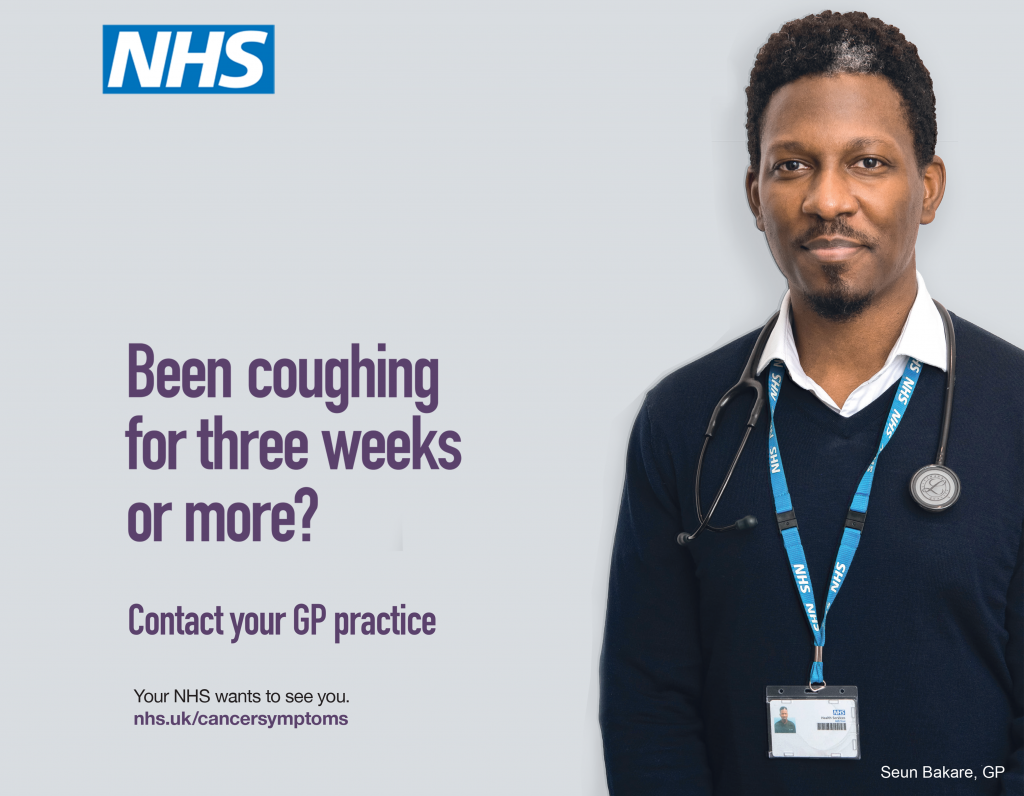Lung Cancer Awareness Month: Dr Bakare urges Black community to recognise lung cancer symptoms
- Lung cancer is the third most common cancer in England with around 39,990 cases diagnosed each year
- Around 89% of those diagnosed with lung cancer are aged 60 and over
- In 2019, lung cancer accounted for 12% of all cancer diagnoses in England and 20% of all cancer deaths
- Over 60% of those diagnosed with stage 1 lung cancer have a five-year survival rate compared to just 4% for those diagnosed later.
Suspected lung cancer referrals were slower to recover from the impact of the Covid-19 pandemic than most
other cancers, despite being a leading cause of cancer death. This Lung Cancer Awareness Month, a GP
speaks to us as new data shows that 63% of Black people surveyed did not know that a persistent cough for over
three weeks could be a sign of the disease.
Dr Seun Bakare, GP Clinical Lead for Urgent Care, who is supporting the NHS lung cancer campaign, is
passionate about changing attitudes within the Black community, which can keep people from contacting their GP
practice and delaying medical help.
“Some of us are apprehensive about seeing our GP if we think something is wrong but if you or a loved one has had a cough for over three weeks, it’s time to make an appointment with your GP,” says Dr Bakare.
Dr Bakare understands that many people in the Black community believe suspected health problems, such as
a cough, may work themselves out on their own.
“We’re here to help but we can only do that when you come into the GP surgery,” says Dr Bakare. “As the
weather becomes colder, it’s quite normal to experience a cough or a cold.
But a cough lasting more than three weeks could be a sign of cancer so don’t wait around for it to disappear.
It’s probably nothing to worry about, but if it is cancer, finding it early will make it easier to treat.”
Here, Dr Bakare answers some of the most common questions about lung cancer:
I thought only people who smoked got lung cancer?
While smoking is a leading risk factor for lung cancer and the majority of lung cancers occur in current or former smokers, it can also sometimes occur in people who have never smoked.
Who can get lung cancer?
Anyone can get lung cancer – there is no single cause. People of any age and background can be diagnosed with
the disease but it’s more likely to affect people over the age of 60.
What are the common symptoms of lung cancer?
As well as a persistent cough for more than three weeks (either a new cough that lasts three weeks or more, or a long-standing cough that gets worse), you should be on the lookout for feeling out of breath when doing normal tasks, any aches or pain when breathing or coughing, or coughing up blood.
Unexpected tiredness and weight loss are also common symptoms, as are chest infections that keep coming back. If you or your loved one has any of these symptoms, please contact your GP right away.
What should I do if I’ve been coughing for more than three weeks?
Definitely make an appointment to see your GP as soon as you can. Your GP will ask about your general health and symptoms. They may examine you and ask you to breathe into a device called a spirometer, which measures how
much air you breathe in and out. You may also be asked to have a blood test to rule out other possible causes, such as a chest infection.
What are the common causes of lung cancer?
As well as smoking, there are many risk factors because we are constantly inhaling chemicals from our environment. This could be in your workplace, air pollution or exposure to radon gas. Your risk may also be higher if you’ve had a lung disease before or if there’s a family history of lung cancer.
If my GP refers me for tests, what will happen?
Your GP may arrange for further tests to investigate the issue. This could be a chest x-ray, CT scan or bronchoscopy. The earlier you see your GP and a diagnosis is made, the earlier treatment can start – increasing the likelihood of survival.
People diagnosed with lung cancer at the earliest stage are nearly 20 times more likely to survive for five years than those whose cancer is caught late. Early diagnosis can make a big difference.
Where can I find more information?
For more information, visit www.nhs.uk/cancersymptoms



